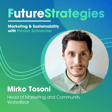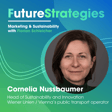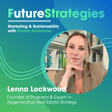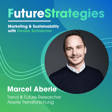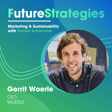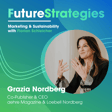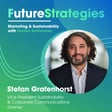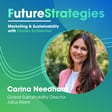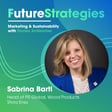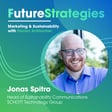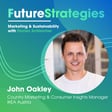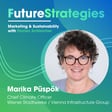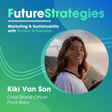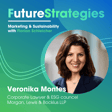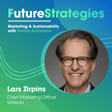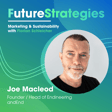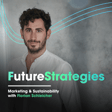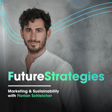Competitive Landscape: Taste and Branding vs. Sustainability
00:00:00
Speaker
in a perfect world, we're just competing on taste. We're not competing on how sustainable you are. We are competing on taste and branding, um the culture behavior shift. Yeah. And in a perfect world, there is the change or the shift from a small company to to a bigger company because everyone works together.
Podcast Introduction: Florian Schleicher on Sustainability
00:00:17
Speaker
Welcome to the Future Strategies podcast. My name is Florian Schleicher. I'm a marketing strategist focused on sustainability. And I'm your host here. You can listen to my interviews with international experts, And together we will explore where marketing strategies and sustainability intersect. With great examples, insightful stories and a look behind the scenes of some amazing brands.
00:00:41
Speaker
If you are curious how to apply all of that for your own business, I do this for my clients from all around the world. But more on that at the end of this episode. Now let's jump into today's interview.
Meet Eske Tammen: Brand Lead at Tony's Chocolonely
00:00:55
Speaker
Today, my guest is Eske Tammen. She is the brand management lead for Germany, Austria, and Switzerland at Tony's Chocolonely, the impact-driven chocolate company on a mission to make 100% slave-free chocolate the norm.
00:01:10
Speaker
With her background in strategic brand building and purpose-led communication, she's responsible for bringing the brand's bold mission to life through campaigns, partnerships, and local activations.
00:01:22
Speaker
So, welcome to the show, Eske. Hey, nice to meet you. Lovely to be here. I'm so happy we can talk a lot about Tony Schocolonely today.
00:01:32
Speaker
But first, I would like to get to know you a little bit more. So you have a deep-rooted history in FMCG from Colgate to Fritz Kohler and now Tony's.
00:01:43
Speaker
But now you work for a company with a very strong social purpose. And I would be interested in what were you drawn to most when you chose that your next chapter should be Tony Schocolonely?
Career Shifts to Impact-Driven Roles
00:01:55
Speaker
Yes. So I started off my career in a big multinational company. And back then I thought that this is where I wanted to work. And then soon I realized that it was the bigger picture that I'm drawn towards, that i want to change something and that more impact-led marketing or impact-led storytelling is something that is really interesting to me because as said, multinational companies more like I would say where people a more drawn towards numbers, towards ah sales, towards maybe also ah quick decisions. And I think as a marketeer, it's interesting to really have stories ready to change something in the people's mind. And yeah, to work for an impact company that also changed something is really helpful for me.
00:02:46
Speaker
Yeah, I totally get that. I worked for McDonald's in my past and I had an amazing experience. I learned a lot there, but it felt so much different than afterwards working for Greenpeace and then thereafter working for Too Good To Go because I and knew why I was waking up every day and getting to work because I was on a mission to do something better that was not just increased shareholder value.
00:03:11
Speaker
Yeah, actually, that was ah one of my questions to you if it was a stretch. coming from McDonald's too to go to go, but maybe we get to that later. So the switch was actually, so I switched from McDonald's to Greenpeace and that was really tough. I think McDonald's to go to go wouldn't have been that tough, but if you work at Greenpeace, McDonald's is one of the enemies.
00:03:32
Speaker
Yes. So a lot of people were like, okay, this is weird. Who is this guy coming here? And what I always told them is, so I worked for the dark side. Now I know how the dark side works. And I can tell you what we should do as a counter move.
00:03:45
Speaker
Because honestly, McDonald's is an amazing brand. and So they have done a lot of good things in terms of brand value and marketing. And I think a lot of brands can learn from this.
00:03:56
Speaker
And then Too Good To Go, I already was deep in the green bubble, so to say. So it was way easier then to adapt. Yeah, same for me a little with Fritz Kohler.
00:04:07
Speaker
I think that was a the drastic change from Colgate to Fritz Kohler. was also very active in Hamburg, where also Tony is located at.
00:04:18
Speaker
So also i have this David versus Goliath mindset with Coca-Cola and Fritz Cola. This really helped me stepping up to Tony's, which is indeed even a little bit more impact driven, rooted with the impact history. So yeah, I understand that.
00:04:37
Speaker
Yeah, let's let's stick with that thought here for a moment. So Tony's Circle Lonely is one of these rare brands that is both instantly recognizable and deeply purposeful, as you mentioned. It's bold, it's joyful, and at the same time, driven by a very clear mission.
00:04:55
Speaker
So can you take us back in the history a little bit? How how did it all come to be? What was the original thing? Why it started? What was the brand's history?
The Founding of Tony's Chocolonely
00:05:05
Speaker
Yes, so there was the dutch a Dutch journalist called Tane van der Koeken. It was in the beginning of the 2000s.
00:05:13
Speaker
And he learned about the Harken-Engel Protocol. The Harken-Engel Protocol is a non-binding agreement signed by major chocolate brands that pledged to eliminate the worst forms of exploitation in cocoa.
00:05:28
Speaker
And While he was learning about it, he also thought, okay, what has been done ever since? And like really deep dive into the topic and saw that there was like no real change towards that goal, also because it was a non-binding agreement.
00:05:44
Speaker
And he was a journalist and also he was having or he's still having a show called Köringsdienst van Waarde. And um he took that problem or that topic of exploitation and cocoa to that show and he wanted to see ah He wanted everybody to see what is the problem with Coco. And in that show, he called up big chocolate brands. He really called them live on show and asked them about that that ah agreement. And yeah, they their progress toward that goal. And that's also really interesting. And you can see still see that show. Yeah.
00:06:21
Speaker
really crazy calls the CEO of Nestle, I think, and asks them, do you know what's really happening in West Africa? Do you know which problems we have in Coco? And a lot of people saw that show, but he was still thinking that not enough people took notice and that it would change a lot. So um He thought of another idea, also quite crazy, I would say.
00:06:46
Speaker
He arrested or sued himself. He said that, I know that when I eat chocolate, that ah child labor or exploitation is involved.
00:06:57
Speaker
And I'm going to sue myself because ah in that knowledge, I am a criminal. But unfortunately, the judge couldn't prosecute him because he also said that if I prosecute you, then I needed to prosecute everyone.
00:07:12
Speaker
And who's eating chocolate. And basically we all know that everyone loves chocolate. Or like the majority of people love chocolate. So yeah, that not went through. And that was when Tain realized that the only thing he could do.
00:07:25
Speaker
Because nobody really wanted to talk to him. So in that show, nobody... really gave him the answers he wanted. The judge also wouldn't help him law-wise. So he said, the only thing I can do is run my own company and do things better and make my own chocolate, which is really good. And that's how he started off Tony's Choco Lonely. And the name Tony's Choco Lonely is also because Tain is not a really known name internationally, so he called himself Tony and Shoko Lonely because he felt very lonely in his fight for exploitation-free cocoa.
00:08:04
Speaker
And yeah, that's how the name came across. Quite a story. And I also love that the company was basically started through activism first.
00:08:15
Speaker
and then setting a business goal. Yeah, that's so deeply rooted, actually. and that's also, I think, what backs it up for us. Yeah. So it's really this structure of first identifying a problem, then designing a solution, and then opening up the whole system.
00:08:33
Speaker
I would be curious, this is not a light topic. Slavery, child labor. How do you, in marketing, combine both the importance of the issue and the gravitas, so to say, but also make it lighthearted and lovely?
Marketing Serious Topics with a Fun Approach
00:08:53
Speaker
Yeah, so I think one of our values at Tony's is making it fun. Mm-hmm. to just have fun at work and i think that is what you just said it's one of the most important things because we know that we won't change things by wagging our finger all the time it needs to be fun and engaging and i think this is when we get people to listen and this is something which is just an important factor in our work i think the big problems light-hearted maybe Yeah, I think that touches upon a very important point.
00:09:26
Speaker
Also, when i was working at Togo2Go, we were also experimenting with how much should we educate, so to say, people about the problem of food waste, because it is a huge problem.
00:09:40
Speaker
But in the end, whenever we talked about the problem, people were shutting their eyes and their ears. because people don't want to hear problems all the time because they already have problems all the time in their everyday life.
00:09:54
Speaker
But what they want is to be entertained and to get solutions. And I think that's the important thing of what you're also doing with your brand to showcase the solution, to give people an easy way, but then still bring up the big topic, so to say.
00:10:11
Speaker
Yeah, exactly. I think we have a lot of problems, ongoing problems in the world, and it's even increasing. We also see that. So people don't want us to talk about the problem all the time. I think for us and for Tony, has said the the impact that we do is really deeply rooted in our history. So it's the hygiene that we do. This is an important factor, I think, to let people know that we are a good company, that we are an impact company, that we want to change something and that they can trust us, that everything we do, we do it right, we do it at our best thoughts. But when we communicate, we also did a change to really make it fun, approachable, um lighthearted, engaging,
00:10:58
Speaker
Because, yeah, said the one thing is the hygiene. You can trust this company. They do good. But in the end, you want to consume and enjoy chocolate. And so that is a stretch that that um I'm struggling and dealing with, actually. Yeah.
00:11:14
Speaker
and And I think a lot of it, especially in impact-driven companies, but also in basically every company at the moment, is that a brand builds a world that people want to belong to.
00:11:27
Speaker
Because in the end, people don't want just to consume a product, but they want to get a fit with their own personality. So what would you say is the identity shift that you tap in culturally? Who does someone become when they choose to eat a bar of Tony's Rocolonely chocolate and not any other brand?
00:11:51
Speaker
Yeah, so that's a good question because in the end we say that Tony's is for everyone because in a perfect world we say that there is no fair and unfair chocolate. like You just decide in the supermarket because you prefer the chocolate because of the taste, you prefer the chocolate because of its branding. But yeah, I said in a perfect world every every chocolate brand should be fair. So that's why we say Tony's is for everyone, not for like the cool hipsters that But we also know that this is the end of the story.
00:12:24
Speaker
We know that for now, we are more addressing people that want to do something good, that take care of their environment, that also yeah just want to make sure that when they consume, they don't consume exploitation and that they yeah really are also part of the mission and to change something. Yeah.
00:12:46
Speaker
I'm curious about one more aspect here. Your product being impact driven, and this is a challenge that a lot of impact driven companies have is how do you balance the impact and the purpose that you want to have with also generating profits because you want to survive.
00:13:05
Speaker
And linking to that also, are you still growing within the sustainability bubble of people? Or have you already begun the shift into the broader mainstream where people, as you mentioned, don't just care about sustainability or or social impact, but they just want chocolate that they like and enjoy?
00:13:26
Speaker
Yeah. So to your first question. We have two metrics that we look at. It's brand awareness, like every company, I would say, but also impact awareness. And when we do market research, we always look at whether people know that there are problems in Coco, whether they know that Tony's is wiki really working towards that goal.
00:13:49
Speaker
And yeah, on the other hand, also brand awareness. So this is always a struggle, I would say. So you're measuring impact awareness. And I could imagine that this is very relevant for people who have a sustainability background or who are green and and and and conscious.
00:14:06
Speaker
But there is maybe if we are optimistic 10% of the whole population. And you can only grow so much in that segment. So I would be curious, have you already begun to also grow in the mainstream or are you still in the sustainability bubble?
Targeting Mainstream Markets
00:14:22
Speaker
So it's a little bit connected to what I said before. We to we at Tonys, we don't want to be niche. We never thought about only being listed in in organic supermarkets or like small organic stores, but we always thought about, we want to be mainstreamed.
00:14:39
Speaker
We want to compete with the the big brands like Milka, like Ritter Sport, which are really known in Germany and Austria. So we want to go for the supermarkets.
00:14:52
Speaker
So that said, of course, the sustainable bubble will choose us because this is in their minds because they're really open to to companies like us. But in the end, we want to be mainstream. And also, as you said,
00:15:09
Speaker
The sustainable bubble is quite small when you look at the whole population. So we aim to target every everyone in the end and also people that maybe not buy in organic supermarkets or um organic products.
00:15:26
Speaker
Any specific things that you could point our audience towards to where you say, hey this is actually a thing, a campaign or an activation that we did that also reaches outside of the bubble?
Campaign Strategies Highlighting Fair Trade
00:15:39
Speaker
I would say the Tony's fair alta ti tony's fair fair alternative that we did in 2023. This was so impactful, I would say, that um also people outside of the bubble ah saw and realized it. can you Can you walk us through the campaign a little bit?
00:15:56
Speaker
So the idea as I said, the problems in Cocoa are mainly because of poverty. So we know that unfair payment is the main problem that we have in Cocoa.
00:16:07
Speaker
And we know that there are so many programs working towards that problem. And there has been some effort in the past. But in the end, we also know that not all farmers are paid fairly. And this is the basic, the essence, the campaign touches upon.
00:16:26
Speaker
We said that you can make chocolate fairly and produce tasty chocolate. So this is something that does not contradict in the end. so We copied ah big chocolate brands that you might also know everyone knows and said, everyone likes your chocolate. And I also like the chocolate of big brands. it's It's not that they're not tasty, but the thing that is not tasty about it is maybe the problem or the unfair payment that they're not paying all their farmers or all farmers in their supply chain fairly.
00:17:02
Speaker
And so we said, if we can do it, if we can show that we have tasty chocolate that is also paying all farmers a fair cocoa price, then you can also do it. So what really stood out is that we just copied the big bars, the big brands, and everybody was able to see it. And yeah, I think that went just outside the bubble. Again, it's activism at play here.
Purple Bar Lawsuit and Marketing Opportunity
00:17:28
Speaker
Were you sued by any of these companies then? um Yes, actually, Mondelez suit us for using the ah purple bar. the The color purple is really protected by Mondelez. And obviously, we really tried to mimic the bars or the brands. So we wanted people to realize, oh, that is Milka bar. So we...
00:17:54
Speaker
We chose to make it a purple bar. So we we knew that this could happen. And it happened in the end. They sued us and they they said, you are not allowed to produce any purple bar. They were not suing us for accusing them of exploiting cocoa farmers for using the language or the words.
00:18:15
Speaker
They were just suing us for using the purple bar. Yeah, and in the end, this turned out to be interesting because we thought, okay, if if they sued us, then this it would definitely be because of what we we are accusing them for.
00:18:31
Speaker
And it kind of an interesting one. And we said, okay, we we ran that campaign and said, okay, instead of pay your lawyers for suing us for a color, which is interesting, and maybe use the money to pay all your farmers fairly.
00:18:48
Speaker
And this was really something that went beyond and Obviously, it was interesting for press. and Yeah. I think, first, it's a brave move. And I've dealt with my share of legal departments in my corporate past. And I know that these guys don't mess around and they are very cautious in what to do. So first, congratulations on actually doing the campaign.
00:19:10
Speaker
and pushing that through. And then second, I think it's that's actually a great news story that you were sued by one of these companies because then you can expand on the whole campaign and and as you did and highlight another thing, which is, okay, you could invest the same money into something actually useful.
00:19:29
Speaker
Yeah, we needed to change needed to change all the purple bars and thought about what would could we do next. And the marketing stunt that we did was just changing the purple bar to a gray bar. And we had this big billboard in Berlin and we were just putting a gray bar on top of the and purple bar with a little arrow saying it used to be purple, you know, because we were still able to talk about the problem, and still able to run our campaign, but not with a purple bar. So we decided, fine.
00:20:02
Speaker
If that is the case, then let's continue with a gray one, you know, and that sparked attention. yeah I love it. I love it. I would be curious about another topic that I'm also thinking a lot at the moment. And I i recently had a conversation with a trend researcher and we talked about the state of sustainability.
00:20:22
Speaker
Because if we think back, sustainability was the top of mind topic. There were street protests going on. Then a lot of legislation changed. The EU said that the Green New Deal is the next big thing. The US invested heavily in sustainable technologies.
00:20:41
Speaker
And it felt like, okay, there is a movement. But then what happened is last year, the US elected a different president. And it feels like now sustainability is not really part of any boardroom discussions anymore.
00:20:55
Speaker
And I would be curious how you see that both as a person and also working in in brand management for a company that tries to do something good when it comes to sustainability. How do you think the perception of sustainability has changed in 2025? Is it still going strong?
00:21:13
Speaker
Do you still believe wholeheartedly in it? Or has it lost its appeal for the moment?
Sustainability Amidst Global Issues
00:21:18
Speaker
Yeah, it's a good question. As a person, I also i agree. i I also think that if we look at the elections in Germany past year, you know why people have voted for the one or other party. You feel that the ah problems or the sustainability aspect.
00:21:36
Speaker
is less important because there are so many problems in the world, so many problems in Germany and Austria. We have wars. Yeah, and there there are so many things um and everything is kind of connected to sustainability in the end. Everything is connected to to social activism. And the problem, I think, for people is to be overwhelmed. And I also feel that you're not able to to work on every end of the problem. you know youre You're not able to to fix that problem here, which may be because of less rain in Africa and then the other problem of having war in and Europe.
00:22:15
Speaker
So this is the problem and the struggle, I think, that we are facing. And I also feel that I'm a little bit tired of all these news that come across. And I also feel that im I feel a little bit numb then i that I can can change anything. So also for me as a person, I would say,
00:22:35
Speaker
that this I know that it is a big problem but I also feel that there are so many other problems and i have really problems fixing them all and as a company it's a little bit similar I said problems in cocoa is something is a topic that's really far away because you don't see it you don't you don't see the poverty and when you eat your chocolate or consume your chocolate you just have that good feeling and you don't really want to carry about the problems in the beginning of the supply chain, which is why we focus more on on the fun side, on really the tastiness of chocolate, while on the other hand, and do the due diligence and ah do our work in West Africa, continue to do it as we did um on day one.
00:23:22
Speaker
Because we know that is that is our reason for existence and we need to do that. And on the other hand, really talk about the tastiness, talk about the fun, engaging people in chocolate because we think that is the only way that they will really learn about the problems and change something. Because when they eat our chocolate, then they are really changing something. They're really choosing for a fair, good alternative and That is the way we try to to work with it. Yeah, I think it's a tough time.
00:23:56
Speaker
But I think, as you mentioned, it's all linked to sustainability, all these problems that we have from migration to wars, which also have its links to sustainability. If you look at the resources that are involved there, that are fought over, and it all comes back to this one thing.
00:24:14
Speaker
But the problem is, it's not top of mind, because we have more urgent problems, so to say, not more important, but more urgent. yeah But I think sustainability will have a comeback because we'll see how temperatures increase, we'll have more immediate outcomes, and this will change things.
00:24:35
Speaker
But I think the pressure is still not high enough. And I know that from a lot of companies, ah big ones that I work with, that sustainability is still top of mind, but it's not communicated that openly about. And now it's Not in the boardroom all the time, but it's more in task forces and people actually trying to change things and not so much these big speeches that people give.
00:24:58
Speaker
Yeah, true. Actually, we we are already seeing that in Cocoa. So Cocoa prices went up, I don't know how many per percent, but it's it's crazy. And as a consequence, cocoa chocolate prices also go up. So we see that because of not having enough rain in cocoa harvesting areas, that we have bad harvests, which results in higher cocoa prices, which then result in higher consumer prices. And um on shelf, everyone, every brand or every company needed to raise prices because they simply cannot stand it.
00:25:38
Speaker
And yeah, as a consumer, you see these high cocoa prices, you see the high chocolate prices, and this is directly linked to um sustainability in the end. And I think this is just one area of your of your daily life that is changing and there will be so many more.
00:25:56
Speaker
It's all connected. And I think that is a problem because there is no easy fix and people are already overwhelmed by all the information out there. And it's just one more problem that is really hard to grasp.
00:26:08
Speaker
But I'm really happy that there are companies like yours who are still in there and still ah converting people to think more about what they actually do when they eat these tasty chocolate bars.
00:26:20
Speaker
So Eske, before we go to the final three questions, I would be curious, do you have any question for me? Yeah, so my question that I have, I already raised. So I think it's always a stretch coming from a corporate company to an impact company or a company that works towards a more um a different goal in the end. So yeah, I think this is the the question that I had.
00:26:45
Speaker
how that shift for you went in the end? For me, I think it was a very natural shift because I think would it have been the other way around that it would be weird, like going from Greenpeace and to go to go then to McDonald's, that would make not a lot of sense.
00:27:04
Speaker
But like this, it worked out fine. And also now, I work with a lot of companies that do something sustainable, but I also have to say that I work with companies that are not that big on sustainability and they are more looking for someone who can help them with strategic topics.
00:27:21
Speaker
But what i always do is I try to insert sustainability into these projects. Because I feel like that's also the obligation that I have.
Integrating Sustainability in Client Projects
00:27:30
Speaker
And what I feel is that a lot of clients are very thankful for those perspectives because they don't think about it all the time because they just wanted a new brand strategy. they just wanted to new get a new positioning. They wanted to reach a new target audience.
00:27:45
Speaker
But as you mentioned, it's all connected. And if we find a way to not only talk about, hey, this is an awesome product that you should try, but also say, and here is another reason why this is good, or here is something that we're now doing on top.
00:27:59
Speaker
The important thing I think here is to not fall into the trap of greenwashing is to be very precise on what you are doing. not to advertise this is the most green and sustainable product. Maybe you can say, hey, we increased the biodegradable part of our packaging from 10 to 80%.
00:28:18
Speaker
eighty percent That's huge. And I think that these are all signals that customers then see. And especially with big companies in the B2B sector, I know that lots of calls for projects are actually linked to sustainability metrics. So you only get the contracts.
00:28:37
Speaker
if you can also say that you do something sustainable so this is part of the work that i'm doing also educating clients then hey this is something that you could do here yeah so what i'm thinking about we're just saying that maybe having that shift the other way around would be would be difficult or weird for you and this is also something tony's working really working on try to also work with with bigger companies and actually every invite everybody to become a member of Tony's Open Chain. So use our supply chain that we built for their company to change a company from within, actually. So in a perfect world, Milka would come to us and say, we want to be we want to use your supply chain. We want to tap on your work that you've done in the past and we
00:29:31
Speaker
want to pay all farmers fairly. And this is the bigger picture in the end to change companies from within to maybe be the underdog, but also ah we do our best to that we can.
00:29:46
Speaker
So why not share it with with other companies that also want to improve? and And I think that's actually the real hard work because companies like Tony's, like Too Good To Go, like Oatly, all good and great. But the market share is still not as big as the others.
00:30:04
Speaker
But if we could get Coca-Cola, if we could get Milka, because you mentioned them, to change their supply chains, Just 10% on a scale, that change would be massive. so Yeah, we know that we cannot change the world on our own. We need partners, we need people, we need companies to join us. And that is, I think, the bigger picture and also connecting to what I said before, that in a perfect world, we're just competing on taste.
Envisioning Future Competition Based on Taste
00:30:30
Speaker
We're not competing on how sustainable you are. We are competing on on taste and branding or um the culture behavior shift. Yeah. And in the perfect world, there is the change or the shift from a small company to to a bigger company because everyone works together. All right. So to sum this all up, I would go to the three final questions that I ask everyone here. So number one, Eske, is what is good marketing to you in three words?
00:30:59
Speaker
It's a good one. So I think it's bold, it's approachable and fun. I like that. Very on brand for you also. Yeah, I hope so.
00:31:11
Speaker
Then I'm doing a good job. What is the future of marketing in your point of view? Yeah, and that's ah difficult, I would say, because when I look at the history where we trusted cigarette brands that said ah smoking is healthy.
00:31:26
Speaker
We are now in a stage where we have a lot of AI and we don't know what is wrong and what is right. And I think in that world, everything is possible. You can just say everything, you can create ah everything. So the future of marketing for me is on the one hand, of course, AI driven, because this is just something that is part of of your daily work. But because this is so technical, I would say one of the most important aspects will be being approachable, being with the people, focusing on engagement and really ah do what AI cannot do and be just there for the people that love your brand.
00:32:07
Speaker
And work with AI on the one hand on be approachable and fun and bold, what I just said, on the other. And I think actually this counterweight, we see more and more pop up as a more offline focused or centered culture where people again want to meet in real life. And where also brands tap into that, where they create communities or join communities.
00:32:32
Speaker
We see that from book clubs to run clubs to yoga retreats and so on. People really enjoy coming back together in real life. And it's kind of like a return to real that we see also, especially with AI.
00:32:46
Speaker
And I also think that we we see that and a lot of people don't follow brands on on social media. are They just don't want to because it's just but in their minds is ads and i think something that will also change or that we also see changing is the shift towards like low funnel ads that are just promoting your product towards storytelling to make it light-hearted in the end yeah absolutely great stuff so final question what is a book that you would like to recommend here
00:33:17
Speaker
Yeah, so I got that question from you before, and I really thought about it because I just became a mother, so there's not much time to read. But one book that I, or the recent book that I read was from Trevor Noah. I don't know if you know him, a comedian from South Africa, and the book is called Born a Crime.
00:33:39
Speaker
And I really liked it because also there he was talking in a fun way. he ah touched a really um hard topic in the end that he was born a crime because he was the child of a cousin mother. a black woman in South Africa and I think Swiss German father. So a a white man from Europe.
00:34:01
Speaker
And this was during apartheid. This was a crime. And he Yeah, just talked about the problems that he was facing. But something one thing that I found really energizing or surprising was um how he showcased how he really found his way in all the communities, in the white community, in the black community, in the colored community, where he was actually, as a colored child, he was actually in. And also how he showed how he actually and became part of all the communities because he really adapted.
00:34:37
Speaker
And yeah, all that in a really fun way. And this is something I can really recommend. I love that, especially as this book recommendation also fits the overarching theme of your brand, Tony's Circle Only. It's a heavy topic, but you can still present it in a fun or lighthearted way so that people actually listen to it or read it.
00:34:59
Speaker
Yeah. Eske, thank you so much for taking the time today, talking with me, sharing your insights and yeah, sharing some lightheartedness and fun also along the way through the brand stories.
00:35:14
Speaker
Thanks. You're welcome. I look forward to speaking to you soon and have a great rest of your day. You too. Bye. Bye-bye. And that's it for today.
00:35:24
Speaker
Thank you so much for listening. If you've enjoyed this episode, please forward it to a friend or a colleague. This would mean the world to me as I pour my heart and a lot of energy into producing this podcast with all the brilliant minds that share their perspective here.
00:35:40
Speaker
And if you know the value that a great marketing strategy brings to really connect with your target audience, give me a call or send me a message. I'd love to get to know you and your projects.
00:35:52
Speaker
You can find me on LinkedIn, Instagram, or through my newsletter, where I write in-depth thought pieces that help you build a successful and exciting marketing strategy.
00:36:03
Speaker
Again, thank you so much for listening. I really look forward to sharing more with you in the future.

